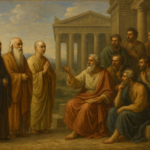Nagarjuna
- Home
- Philosophers
- Nagarjuna
Nagarjuna
If philosophy is about unravelling assumptions and shifting how we see the world, Nāgārjuna is a master of that craft. Often considered the most important Buddhist philosopher after the Buddha himself, Nāgārjuna lived around the 2nd century CE and founded the Madhyamaka (Middle Way) school of Mahāyāna Buddhism. Drawing from the Buddha’s early teachings, he took the concept of dependent origination—that nothing exists independently—and pushed it to its logical, radical depth: everything is empty of a fixed essence. Through razor-sharp reasoning and poetic insight, he dismantled not just metaphysical claims, but even clung-to ideas about truth, self, and reality. His philosophy doesn’t aim to give you firmer ground—it aims to show you that you don’t need it.What Can He Teach Me?
Nāgārjuna’s teachings aren’t about giving you a comforting worldview. They’re about freeing you from rigid ways of thinking and helping you navigate life with clarity and compassion. Here’s what he invites us to reflect on:- Everything Is Empty – But not meaningless. Emptiness (śūnyatā) means things don’t have a permanent, independent identity. This can sound unsettling—but it’s also liberating. If everything is in flux, so are our problems, our roles, our identities.
- Avoid Extremes – His “Middle Way” warns against getting stuck in rigid binaries—like existence vs. non-existence. Most things in life aren’t black or white. Wisdom is learning to hold space in between.
- Detach from Views – Nāgārjuna didn’t just deconstruct others’ ideas—he also questioned his own. Clinging to views, even Buddhist ones, leads to suffering. Letting go doesn’t mean apathy—it means openness.
- Use Logic to Go Beyond Logic – He used reason not to construct systems, but to show the limits of reasoning itself. This isn’t about being irrational—it’s about knowing where reason starts to loop in on itself.
- Live With Compassion – Beneath the philosophical sharpness is a deeply ethical message. By realizing the interconnectedness of all things, we can act with more kindness, humility, and care.
Notable Works
Nāgārjuna’s writings are dense but brilliant. They challenge conventional thought and push the boundaries of logic and language:
- Mūlamadhyamakakārikā – His foundational text, translated as “Fundamental Verses on the Middle Way,” lays out his philosophy of emptiness and dependent origination through a series of profound and paradoxical arguments.
- Śūnyatāsaptati – Seventy Verses on Emptiness. A poetic and concise reflection on what it means to say things are “empty.”
- Vigrahavyāvartanī – In this polemical work, Nāgārjuna defends his philosophy against critics, exposing flaws in conventional reasoning while showing why clinging to fixed logic fails.
- Ratnāvalī (Precious Garland) – A practical text offering guidance on ethics, compassion, and wisdom, traditionally framed as advice to a king. A more accessible entry point into his thought.
- Suhṛllekha (Letter to a Friend) – A personal and heartfelt letter advising how to live a good life while still walking the path of wisdom.


